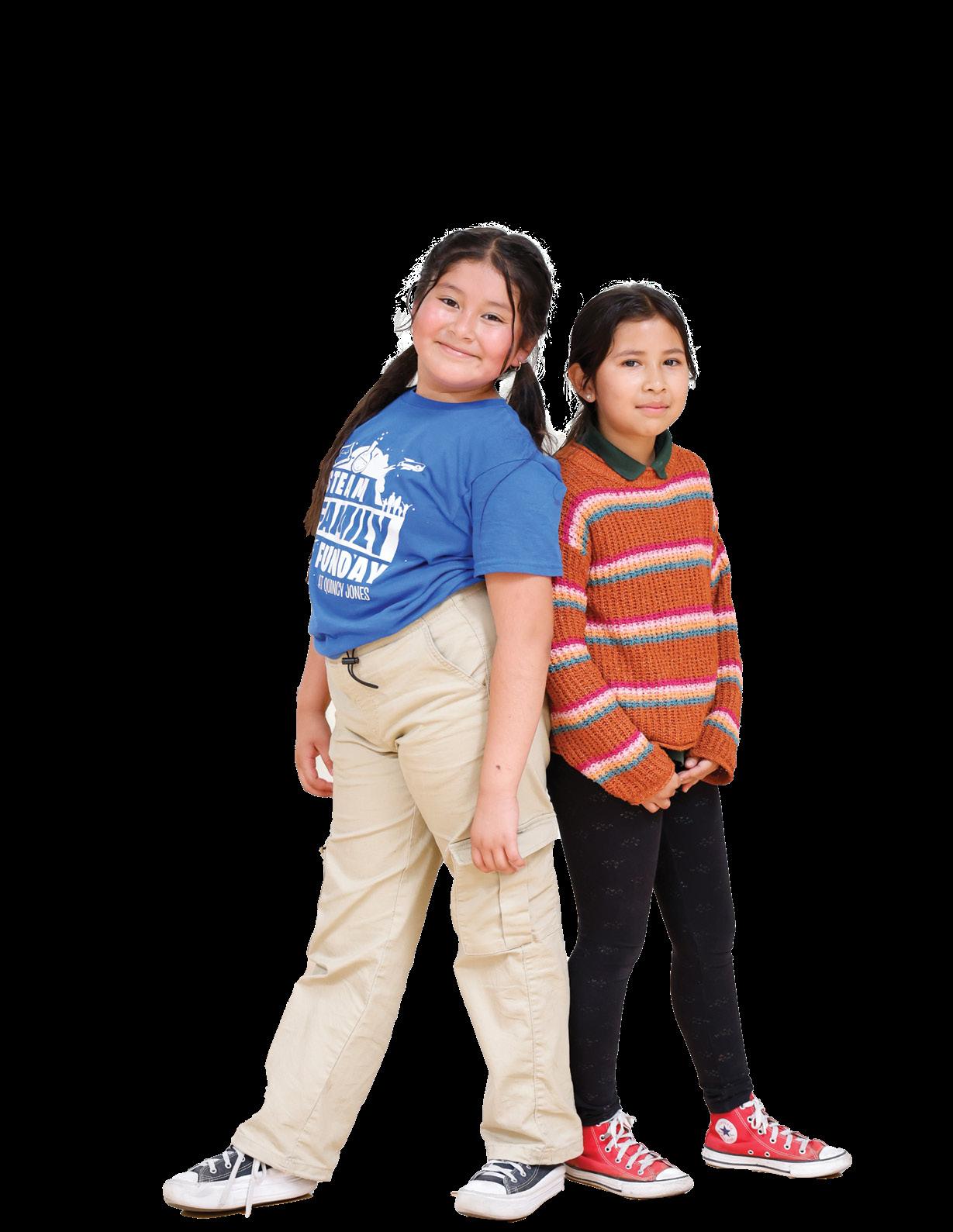
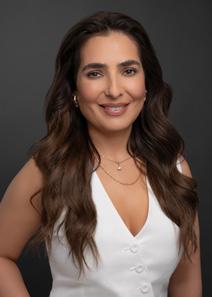

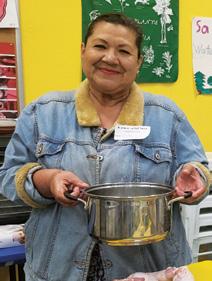


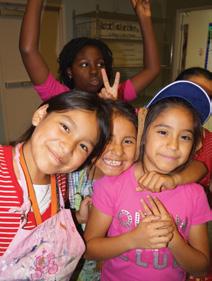

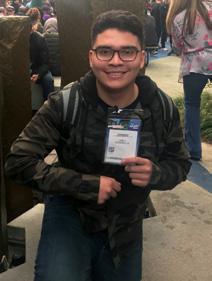
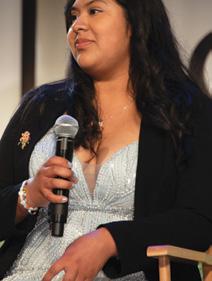
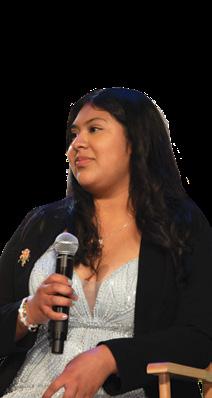
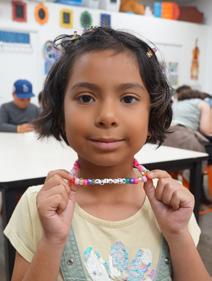
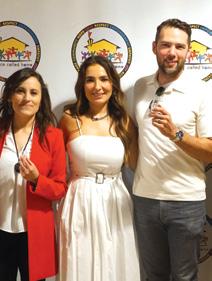
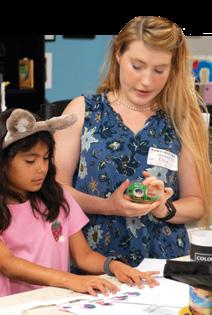

















It is with great enthusiasm that I share A Place Called Home’s 2025 Newsletter with you. This year has presented our community with some unique and heavy challenges; fear and disruption, a common narrative among the people we serve. And yet, amidst the uncertainty, the hope, resilience, and enduring joy of our members, families, and staff burn brighter than ever. And you, our supporters, partners, and advocates - you are the neighbors who show up for us so that we can all stay close to each other and the work that fuels us.
A Place Called Home was founded on nimble action in response to the needs of the youth in South Los Angeles. Its formation was an act of tenderness toward those affected by LA’s 1993 Civil Unrest, and our commitment to meeting the moment has not wavered since then. The challenges the community faces today have inspired us at APCH to reflect inward; honoring and remembering the incredible stories in each person who has walked through our doors over the past 32 years.
This year’s newsletter is a celebration of those stories; the shared histories that make up A Place Called Home. In these pages, you will uncover the amazing voices of our members, staff, and families - past and presentwhose culture, spirit, and passion have shaped what we as an organization are today. As you get to know each person, I hope you will feel as inspired by them as I do to make a difference for the youth we serve.
Over the past year, we have made an immense effort to foster deeper conversation with our members about their experiences, their dreams, and their struggles, inside and outside of our campuses. Today, our youth face unique challenges: fears around immigration and mixed-status families, reading and math scores being down in LAUSD, college and housing getting less affordable every day; all of these things weigh on them. But we share their commitment to their futures as leaders, creators, and agents of change, and it is our responsibility to protect, nurture, and champion their right to the tools they need to thrive. We are doing this by strengthening our programs and services, prioritizing the safety and security of our community members, and investing in our greatest asset: the staff. Our members consistently say it’s our staff that brings them back to A Place Called Home. That’s why it’s so important to me to invest in training on topics like trauma-informed care, and to empower staff to listen deeply to our youth and adjust our programming based on their voice and choice.
We can’t do it alone, neighbor. We need you close. You are a critical part of this work. When you donate, mentor, volunteer, or simply show up for us, you bring this home - our home - to life. As you read this newsletter, I hope you will see how your continued presence and generosity fuel our service and help us continue to adapt and grow with the ever-shifting needs of South Central youth and families.
Thank you, neighbor, for being a part of our story. The future may be uncertain, but I know that together we can make it bright!
With gratitude,
Norayma Cabot Chief Executive Officer
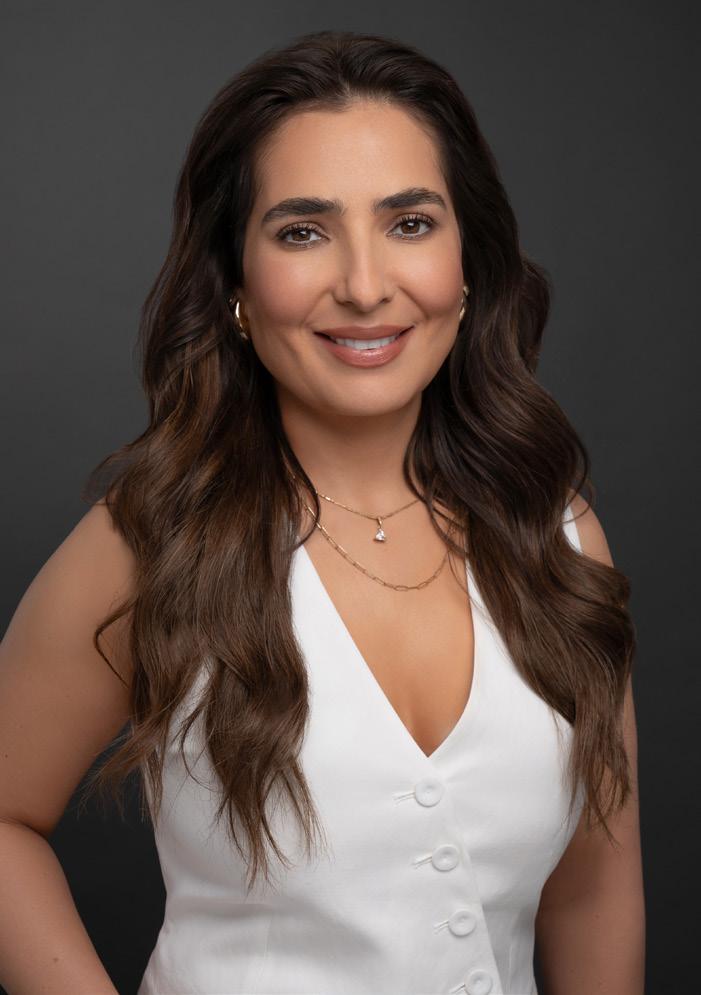
This has been an exceptionally challenging year for our community. Although APCH’s neighborhood is resilient and culturally vibrant, youth here continue to face serious socio-economic obstacles. According to a 2023 study by USC Dornsife, over 1 million residents across Los Angeles County are food insecure - and South Los Angeles has one of the highest rates of food insecurity in the county, with 1 in 4 people uncertain about their next meal. More than 54% of adults over the age of 25 in our community do not have a high school diploma, and only 7.3% of adults age 25 and older have attained a bachelor’s degree or higher. At APCH, 86% of members live at or below the federal poverty line, and all qualify as low-income. More than that, children from lower socio-economic backgrounds face higher risks of cognitive and emotional challenges, while having less access to mental health care (Alegría et al., 2015). That’s where we come in.
The past year alone…
• APCH has provided 50,000+ hours of programming and support, through classes in the arts, athletics, culinary arts, mentoring, professional readiness, counseling, and more!
• We’ve served 17,000+ meals to our members.
• We’ve provided $52,000+ in direct support to APCH families most in need.
• We’ve distributed 12,000+ bags of free groceries through our weekly Family Resource Depot.
• We are currently supporting 127 students through their college journeys with our APCH Shaheen Scholarship Program.
• We’ve provided 1,800+ hours of mental health counseling support to APCH families and youth.
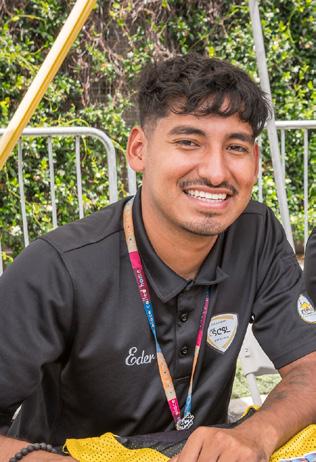
Here’s What APCH is Doing About It
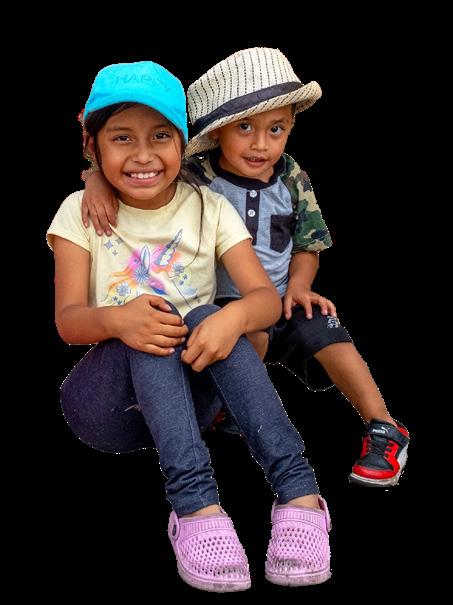
It’s not only important to prepare students for specific careers but also for lifelong learning and adaptability for the ever-changing economy. Career readiness helps youth build confidence, informed decisions, and achieve long term success.
Students in underserved communities often lack the reliable internet, devices, and digital literacy needed to fully participate in their schools. APCH helps close the gap, ensuring all members have access to technology and digital learning.
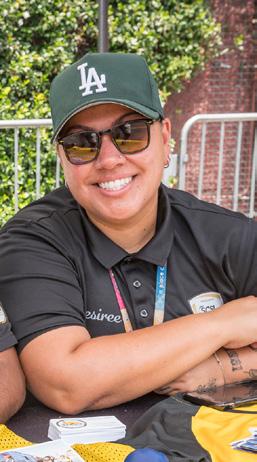
90% agree that there is an adult who cares about them at APCH
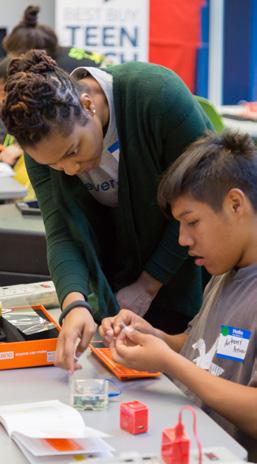
88% of members reported strong or improved social-emotional skills
80% feel like their ideas and opinions matter at APCH
87% of teen members want to make a positive difference in their community
72% of teen members know what kind of career they want to pursue thanks to APCH
79% of members got counseling/mental health support when they needed it
88% of High School members agree that being a member at APCH helps them feel more prepared for their future
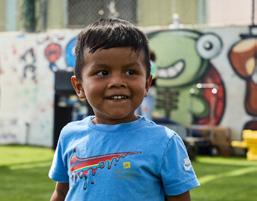
89% of members can access a computer when they need one at APCH
84% of members are pretty or very likely to recommend APCH to a friend


The aroma of smoky dried chiles and sharp raw onion fills the kitchen at A Place Called Home (APCH) as teens work in small groups, carefully cutting cilantro and slicing garlic while discussing proper knife techniques. For these members, learning to make pozole—a traditional Mexican soup—is about much more than cooking. It’s about pride in their heritage, building confidence, and developing life skills that extend well beyond the kitchen.
Cooking competitions are being reintroduced, and basic skills are getting a complete upgrade— all part of this fall’s overhaul to create a truly professional-level culinary program for members. “We’re resetting the basic skills across all levels,” said Ana Maria Perez Paulino, Senior Director of Program Operations. “And we are building a really strong foundation so both our culinary classrooms can operate every day.”
The new curriculum introduces students from second-graders through high school teens to kitchen safety, food safety, recipe reading, basic nutrition, technical knife skills, cooking methods, and meal preparation. “That’s the pipeline,” Perez Paulino explained. “The ultimate goal is for teens
to complete the program, then intern in our kitchen, with hopes of securing externships to experience restaurant work over the summer.”
The hands-on approach makes this a popular class. ”It’s embracing all the senses,” Perez Paulino noted. “You get to use your hands and then you get to eat. They have so much pride sharing what they’re making with friends and family.”
The program balances familiar comfort foods— pasta is always popular—with new dishes like crepes. Staff also elicit input from the members at the beginning of the year as to what they would like to make. “Youth voice is really important to us,” she said. There’s also emphasis on integrating dishes from their cultural wheelhouse.
Guest chefs from local restaurants will continue to visit, along with member parents who share their expertise. This model came to life during a recent culinary lesson, when teens gathered around the steel kitchen table, working in pairs to prepare vegetables as Emma Alfaro, whose son Carlos also attends APCH, shared her family’s culinary heritage.
“En mi familia, se hace pozole desde los tiempos de mi abuela,” Alfaro said. Speaking in Spanish, she explained that her family has been making pozole since her grandmother’s time.
Emma grew up on a ranch in Mexico where corn cultivation was woven into daily life. “In our culture, we grow corn and from that, we make pozole,” she continued. “Since we were children, we watched our grandfather plant vegetables. It’s a beautiful culture—you plant, harvest, and eat. I wanted to teach them that it’s important to grow our own vegetables: cilantro, radish, onion. This is how the pozole they eat is made, honoring our traditions.”
Throughout the lesson, as students carefully followed Emma’s instructions, dicing vegetables and learning the soup’s cultural significance, the kitchen buzzed with engagement—exactly what Perez Paulino hoped to achieve.
“Everything we do is about setting kids up for success while enjoying the present moment,” Perez Paulino concluded. “Whether this is just something fun they do or a career path they consider, either way is fine. They’ll leave here knowing how to make food for themselves and their loved ones.”
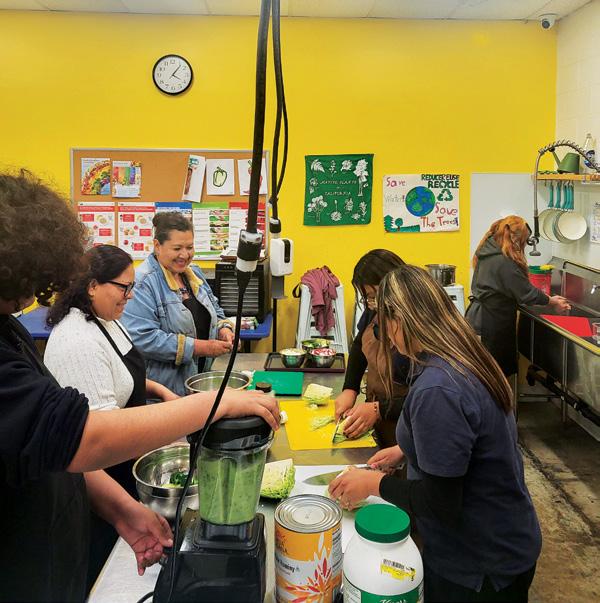


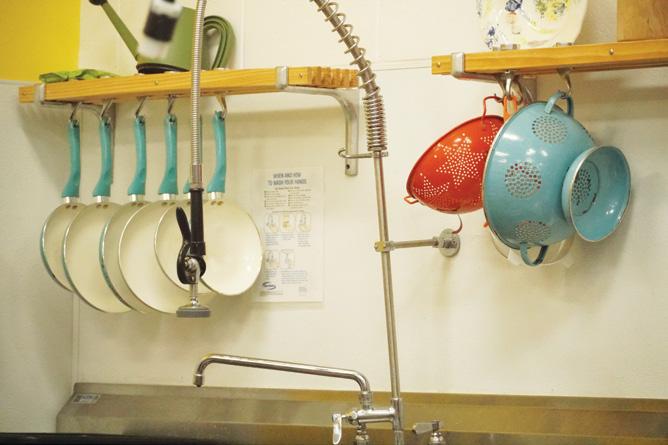



For the Base
· 2 cups hominy corn (dried pozole corn) or 2 cans (29 oz each) prepared hominy, drained
· 1 large white onion, quartered
· 1 head of garlic
· 2-3 lbs pork shoulder or Boston rump, cut in chunks
· OR 2-3 lbs chicken (thighs and drumsticks work best)
· Salt to taste
· 8-10 cups water (or enough to cover ingredients)
For the Green Mole
· 6-8 pasilla verde chiles (or poblano chiles)
· 2-3 serrano chiles
· 2-3 jalapeño chiles
· 4-6 garlic cloves
· Chicken or pork broth (from cooking the meat)
Prepare the Base

· 1 head iceberg lettuce, finely chopped
· 4-5 radishes, thinly sliced
· 1 white onion, finely diced
· 2-3 limes, cut into wedges
· Tostadas or tortilla chips
· Mexican oregano (optional)
· Chile piquín or hot sauce (optional)
· If using dried hominy, soak overnight and cook separately until tender (2-3 hours). If using canned, drain and set aside.
· In a large pot, bring 8-10 cups of water to boil. Add the quartered onion and head of garlic.
· Add the pork or chicken to the pot and cook until tender (1.5-2 hours for pork, 45 minutes for chicken). Remove meat and shred when cool enough to handle. Reserve the broth.
· Add the cooked hominy to the pot with the reserved broth.
Make the Green Mole· Roast the pasilla verde, serrano, and jalapeño chiles on a comal or dry skillet until charred and softened.
· In a blender, combine the roasted chiles with 4-6 garlic cloves and about 1 cup of the cooking broth.
Blend until smooth.
· Strain the sauce through a fine-mesh sieve to remove any chunks.
· Add the strained green sauce to the pot with the hominy and broth.
Finish the Pozole
· Return the shredded meat to the pot.
· Season with chicken or pork broth concentrate instead of salt or use salt to taste.
· Simmer everything together for 15-20 minutes to blend flavors.
· Adjust seasoning as needed.




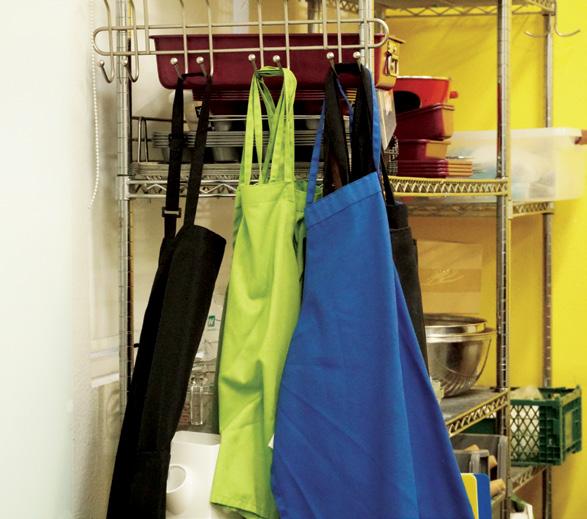
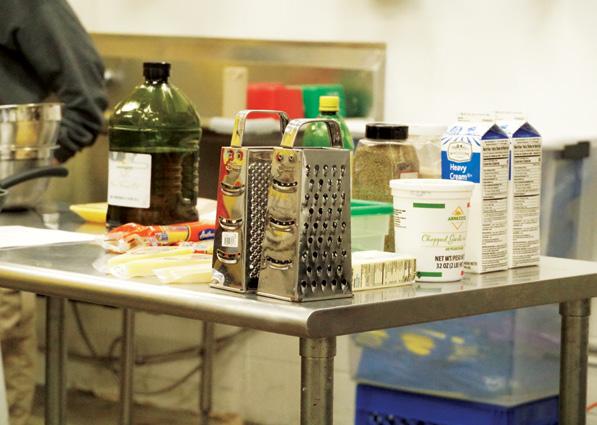



Sister Pat and Bob Israel couldn’t have come to A Place Called Home (APCH) from more disparate pathways. He owned a movie marketing agency in Hollywood, and she was a nun with the Religious of the Sacred Heart of Mary, recently returned to the states from Rome.
It was the late 1990s and both Bob and Sister Pat had been looking for a different way to give back. Instead of sending holiday gifts to his corporate clients each year, Bob wondered if that money could be better spent supporting a worthy organization. Sister Pat had spent 10 years out of the country and, knowing about the civil unrest in Los Angeles, wanted to see if she could volunteer in South Central.
For both, stepping onto the converted warehouse of APCH for a tour was all it took—they were hooked.
Sister Pat started as a volunteer in LAUSD’s Alternative Education Work Center Program (AEWC) in early 1997 and was soon recruited
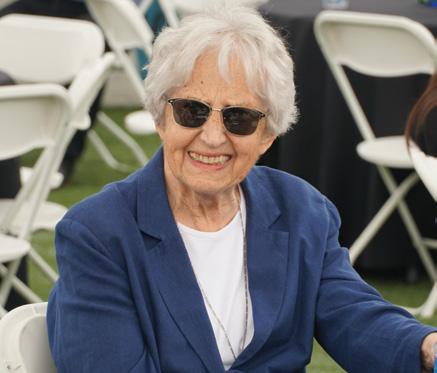
by Debrah Constance, APCH’s Founder, to be a Co-Director of Programs. She served in this role for six years. When she was tapped by her Religious Community to take on another role in 2003, APCH wasn’t ready to give her up and she wasn’t ready to leave. When the offer came to join the board, she quickly accepted. Bob also made good on his initial promise to give and in 2000, when he sold his business, he came on as a board member.
“Our early board meetings were discussions about how we will come up with the money to cover the agency’s expenses that month?” Bob said. “And we went from an organization that had maybe a million dollars a year to provide services to kids, to an organization that had $10 million, including inkind. Those gifts helped expand the staff, expand the programs, and grow the vision.”
Looking back on his quarter-century of board service, Bob’s greatest sources of accomplishment come from his success in attracting distinguished leaders to the board, his creation of an annual gala that became a million-dollar fundraising
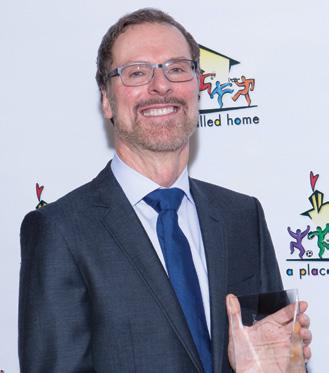
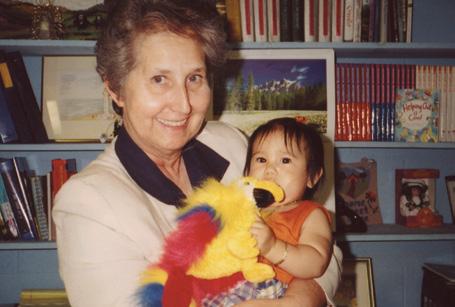
cornerstone, and his pivotal role in recruiting APCH’s visionary leader, Jonathan Zeichner, who served as Executive Director from 2009-2022.
“We had great supporters,” Sister Pat said. “You have to remember the environment of South Central at that time. It was a very dangerous place. The streets were dangerous. So, it was a risk for people to support A Place Called Home.”
Both pointed to the many programs that came to fruition during their tenure, including a board mentorship program, along with a slew of partnerships, starting with HBO, Warner Bros. and the Berklee College of Music in Boston. During this early era, Linda and David Shaheen came to APCH and realized their dream of starting a scholarship program.
“When more programs began to happen, more members started coming after school,” Sister Pat said. “You would see a young person who just would blossom before your eyes because of opportunity. And then when Linda and David Shaheen came along, they were able to go on to college. Few would have dreamed of going on to college when Deborah started A Place Called Home. But it happened.”
As they step back from their board roles, Sister Pat and Bob leave behind a transformed organization and a lasting legacy.
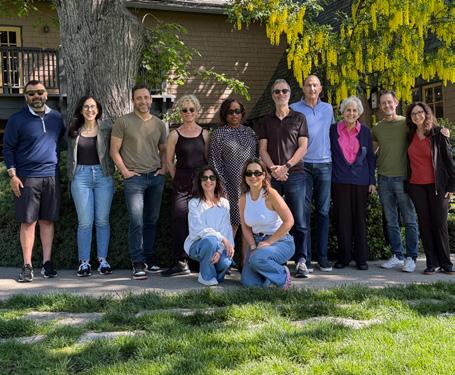
For Sister Pat, her legacy is personal. “I think it’s going to be that I showed up for them,” she said. “I showed up to open the place. I showed up to close the place. And I listened. When I first started at A Place Called Home, I was amazed that some of the members never had an adult who listened to them. So yes, I did that.”
They are both aware that as they transition to Lifetime Directors, they leave a big hole. “This is an opportunity to make a real difference in the community,” said Bob on how he would attract new board members. “It’s also an opportunity to have a positive board experience where you’re appreciated and put to work in a way that’s sensitive to where you can make the best contribution.”
He goes on to add that he met some of his now closest friends on the board and that his involvement with A Place Called Home is one of the things he’s most “proud of” when he looks back on his life.
Both see opportunities for the future as endless. A place where every child’s potential is recognized, nurtured, and celebrated, regardless of which zip code they call home.
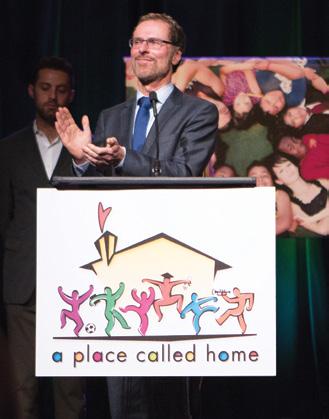
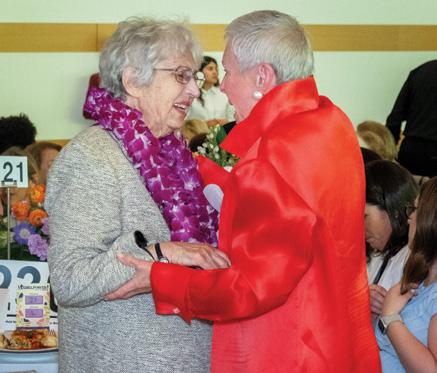

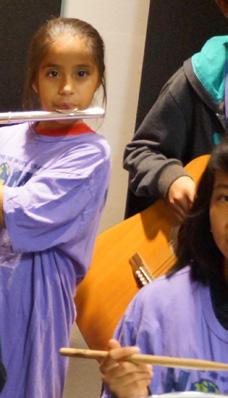
Abigail Mena had the opportunity at A Place Called Home (APCH) to participate in a lot of programs: nutrition, music, art, sewing, graphic design, technology, tutoring, film and dance. For her, this variety wasn’t just a nice perk—it was transformational. “I like being exposed to different avenues of life — I don’t want to get stuck in a box,” Mena explains. “If I hadn’t joined APCH, I wouldn’t have been able to try all these things. I wouldn’t know everything I know now. It helped shape my identity.”
The Mena family moved from Whittier to South Los Angeles when she was seven. “It was a huge transition,” she admitted. At that time her cousins were going to APCH and her mom enrolled her. “I learned how to design T-shirts,” she said. “I took flute—I was really good at it. I never thought I would play the flute, because who thinks of playing the flute? It was just offered, and I took it and for some reason it stuck for three years.”
Mena shares that the schools she attended didn’t offer the types of programs she was able to take part in at APCH. “School was just school. They don’t have the funding. It was heartbreaking to have that realization as I got older.”
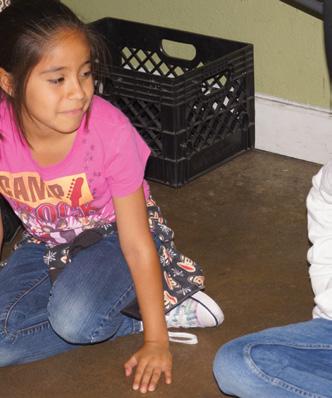
A core memory of her time at APCH was being part of the “Be Kind, Rewind” program in its early stages. She and a group of members reenacted a scene from “Ghostbusters,” outfitted in green jumpsuits with handmade ghost buster proton packs made by an APCH staff member. They strode through downtown Los Angeles. “We were recording, and I got to test my acting skills,” she said.
Mena’s family was invited to submit a holiday wish list as part of APCH’s Family to Family program, operated through the case management and development teams. They were given personal items from their list, but the one that surprised them the most was four tickets to Disneyland. “We’ve never been to Disney, like ever,” she said. “My parents are first-generation immigrants from Mexico. My mom started crying because it was just like, ‘Thank you for seeing that we deserve to have nice things too.’”
But Mena’s path wasn’t always smooth. During middle school, she went through what she calls “a rebellious stage.” Through counseling offered at APCH and support from close friends, including a fellow APCH member, Isabella, she was able to
work through that difficult period by understanding and learning to heal her unmet emotional and mental health needs.
After graduating from the University of California, Santa Barbara in 2024 with a bachelor’s degree in sociology and a minor in applied psychology, Mena, a first-generation college student, knew exactly what she wanted to do. She now works as a wraparound facilitator—providing comprehensive mental health support services to youth in foster care—for Drew Child Development Corporation, a nonprofit also located in South Los Angeles.
When I was coming back home from graduation, I was like, ‘I’m going to work in a nonprofit,’” she said. Having experienced firsthand the profound impact of APCH, a nonprofit that had given so much to her, she felt compelled to pay it forward. “How am I not going to give back to a community that once gave to me? You don’t really know the change that you can implement in someone’s life just by being there. And so that’s what I carry with myself throughout my life.”
Now, on many weekends, you can find Mena with her friend Isabella, at Café Calle, a Latinoowned coffee shop down the street from APCH. The specialty coffee shop—the first of its type in that area–is also frequented by APCH staffers. It’s a reminder of how the city she lives in and the connections she made at A Place Called Home continue to enrich her life.
out
Shared histories and stories help support our shared future! In the 30+ years that A Place Called Home has been around, we have been home to some incredible staff, members, and community partners. These are just a few examples of the long-lasting connections we have nurtured over the years.
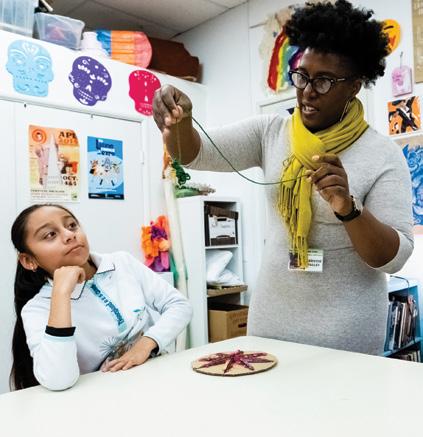
Bernyce Talley, our Associate Director of Arts & Creative Expressions, has been part of the APCH family since 2008! Seventeen years later, she heads all things art on our campus, including our Visual Arts, Digital Media, Dance, and Music programs.
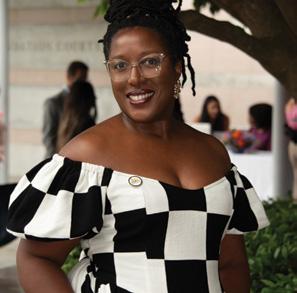
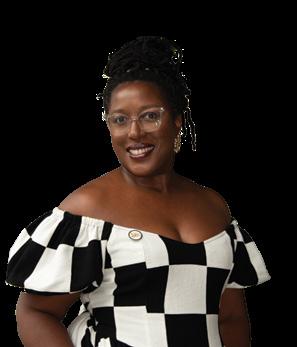


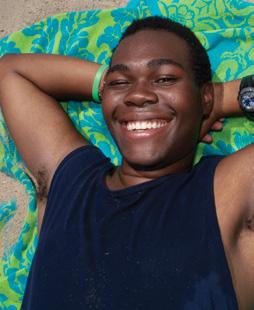
Elijah Douresseau was an APCH member in 2003 and participated in our Youth Leadership Council…22 years later, he has come back to visit and volunteer, and continues his civic engagement on our campus!

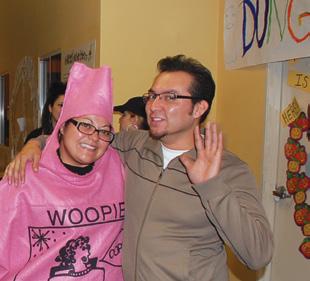

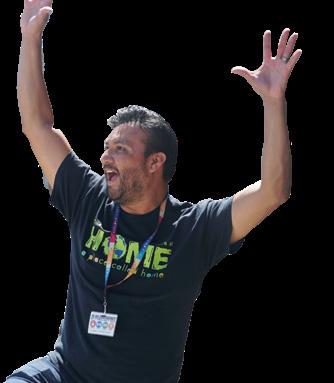
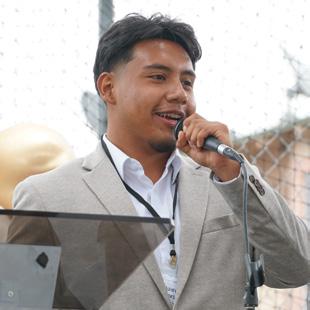
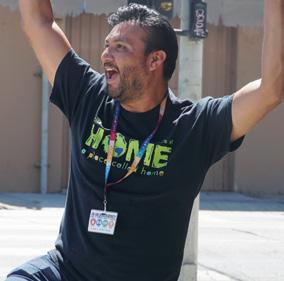
Gilbert Radillo started his time with APCH back in August of 2008 and today, is our Senior Director of Engagement, producing community events, leading volunteer programs and increasing corporate support!
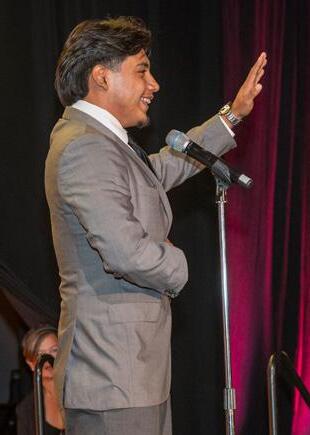
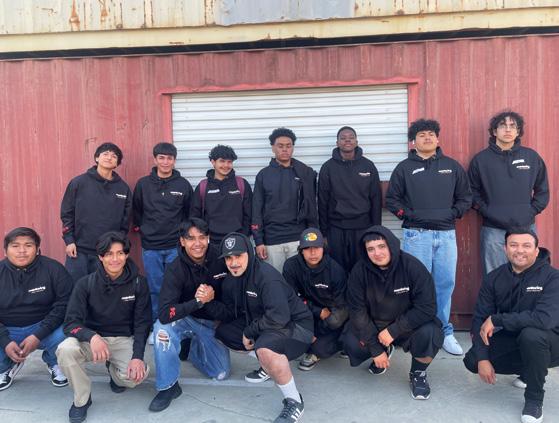
Gabriel Torres, began attending APCH in 2017 as a 9 year old. In his time as a member, he was part of our Journey Program (a class that empowers young male-identified youth with essential life skills that will help them thrive both personally and professionally), an active participant in our Learning and Career Development programs and workshops, and even gave a speech at our 2024 Gala Celebration! In 2025, he graduated high school as an APCH Shaheen Scholar and will be attending California State University, Northridge this Fall!
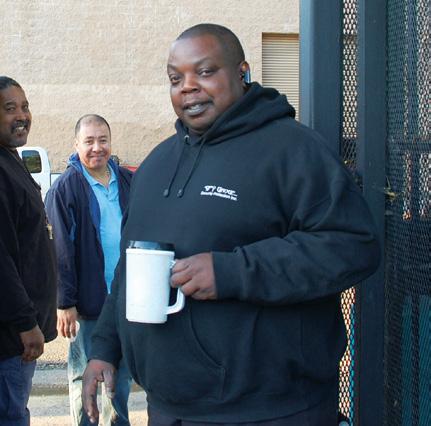
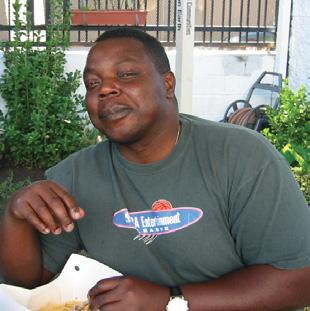
Fun Fact: Al Crawford, APCH’s Security, Safety & Hospitality Coordinator, is the longeststanding member of our staff! He has been protecting our campuses for 27 years!
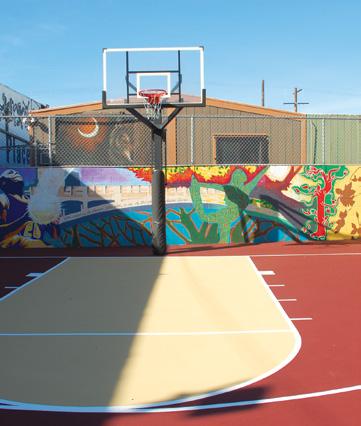
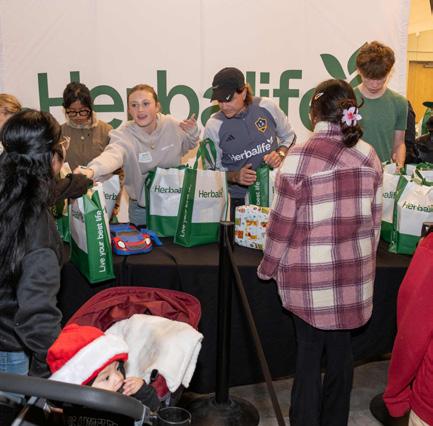
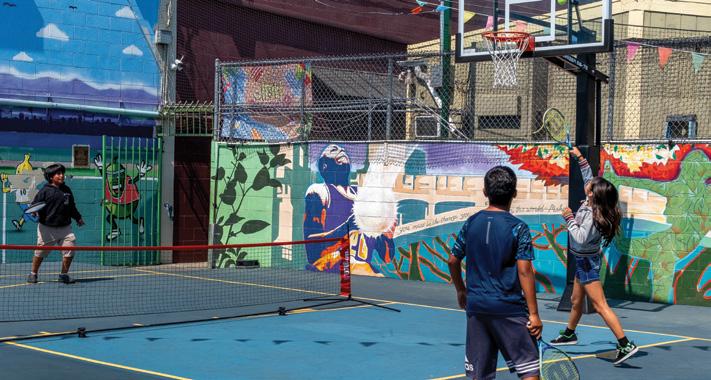

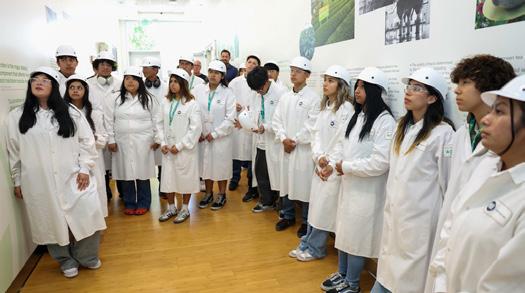
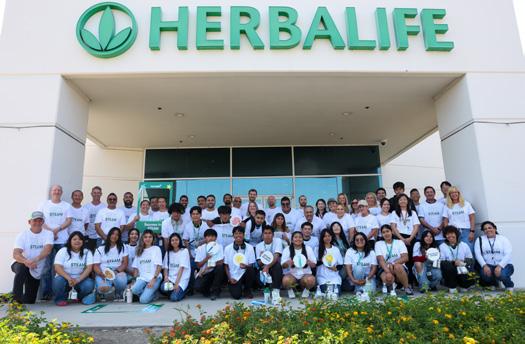
For two decades, the Herbalife Family Foundation has stood alongside APCH as a dedicated partner, proudly becoming their very first Casa Herbalife partner. From hosting a beach day for our members back in 2008 to bringing holiday magic with hundreds of toys for children and families at our most recent Home For The Holidays event, their support has been unwavering every step of the way. This summer, they hosted a special field trip to their Lake Forest facility for their STEAM Mentorship Workshop, where APCH youth heard directly from Herbalife employees in STEAM roles and explored exciting career opportunities.
When all three Cervantes brothers are together on a Sunday, you can find them on the stage playing music for the congregation at Iglesia de Restauración Tiempos De Fe Church in South Los Angeles. Jimmy and Angel on guitar, David on bass. While the gift for music may have come from their father’s family, their talent was nurtured over many years at A Place Called Home (APCH).
Jimmy, now 24, started at APCH when he was in fifth grade. He initially enrolled in the arts program but moved to music soon after. “I took a guitar class and that’s when I found my passion for music,” said Jimmy. “I thought it was just a regular day, but I remember picking up a guitar and I had that feeling of, ‘huh?’ Like what else can I do? And then little by little I started getting more into music.” When Jimmy’s two younger brothers, David and Angel, each reached second grade, their mom also enrolled them at APCH.
Joaquin Pacheco had the good luck of working with all three brothers across the generations. “We’re very lucky at A Place Called Home,” said Pacheco, the Music Program Senior Manager. “Families trust us, they come to us for community and support because they see what we are about and what we do. I’m grateful beyond words to be able to steward these boys to be who they want to be.”
Each brother found his path through the program through a personalized track. When David, the middle child, now 21, joined APCH he enrolled in music and sports. “Music was the first program, thanks to my brother,” said David. “And then athletics because I liked playing basketball at that time.” While at APCH, David had the opportunity
to play on the APCH basketball team, which he stayed on until his senior year.
He also followed in Jimmy’s footsteps and joined Journey, a mentoring class designed for middle school male identified boys. “I learned about manhood and taking care of myself,” said David. “Being smart and responsible. It was really helpful overall.”
David also joined the APCH band, 29Live! “I feel adrenaline when I play,” David said. “All the stress goes away.”
David was invited three summers in a row to be part of a five-week summer program at the Berklee College of Music in Boston. The program, offered through the Berklee City Music Network, was established in 1993 to provide music education to youth from underserved communities. APCH was one of the first partners. As for the opportunity, David admitted, “At first I was shaky, because at that time I felt like I wasn’t good enough, but Mr. Joaquin said, ‘You’re good and you should go and experience it.’” Up until that point, David had never left the state, nor been on an airplane.
He was later accepted to Berklee for college, and is thriving there. David believes that without the help of an APCH Shaheen scholarship, he wouldn’t have been able to attend.
Angel, the youngest at 15, enrolled in both music and sports, later joining the Journey program. He played basketball at APCH until age 13, then focused entirely on music, learning multiple instruments. He
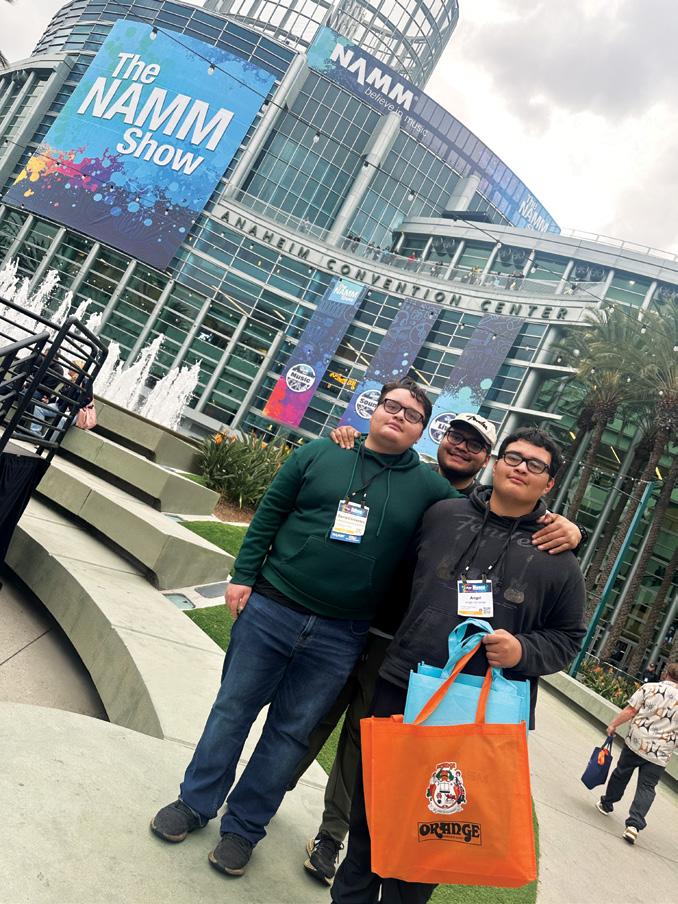
started on ukulele, moved to piano, then guitar, accordion and bass. With this foundation, Angel’s musical curiosity expanded. Recently, he started listening to jazz at APCH and approached Joaquin about learning saxophone. Angel said that Pacheco inspired him. “The way he described how it felt playing the saxophone really caught me,” he said. “When I’m playing, I feel the notes and the sound, and it feels really good.” He hopes to be accepted to the Berklee Summer Program next year—and follow in his brother’s footsteps.
While David and Angel continue their musical journeys, Jimmy is preparing for his next chapter. He is headed to California State University, Long Beach this fall to study business administration. Though he still plays music, he also loves fixing guitars and once made his own guitar from parts. “A Place Called Home has given me a lot and I’ve always appreciated it because they’ve always been there for me when I needed support,” Jimmy said.
“It’s creating the community, the equity, the access,” Pacheco said. “Those are ‘why’ APCH does this. My task when I see the brothers is always being there to help them grow. They’ve all come back in one way or another and said thank you.”

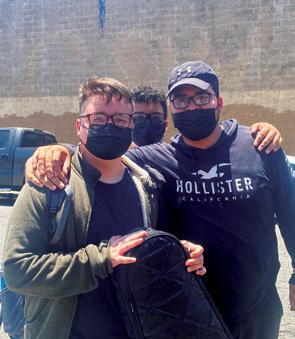
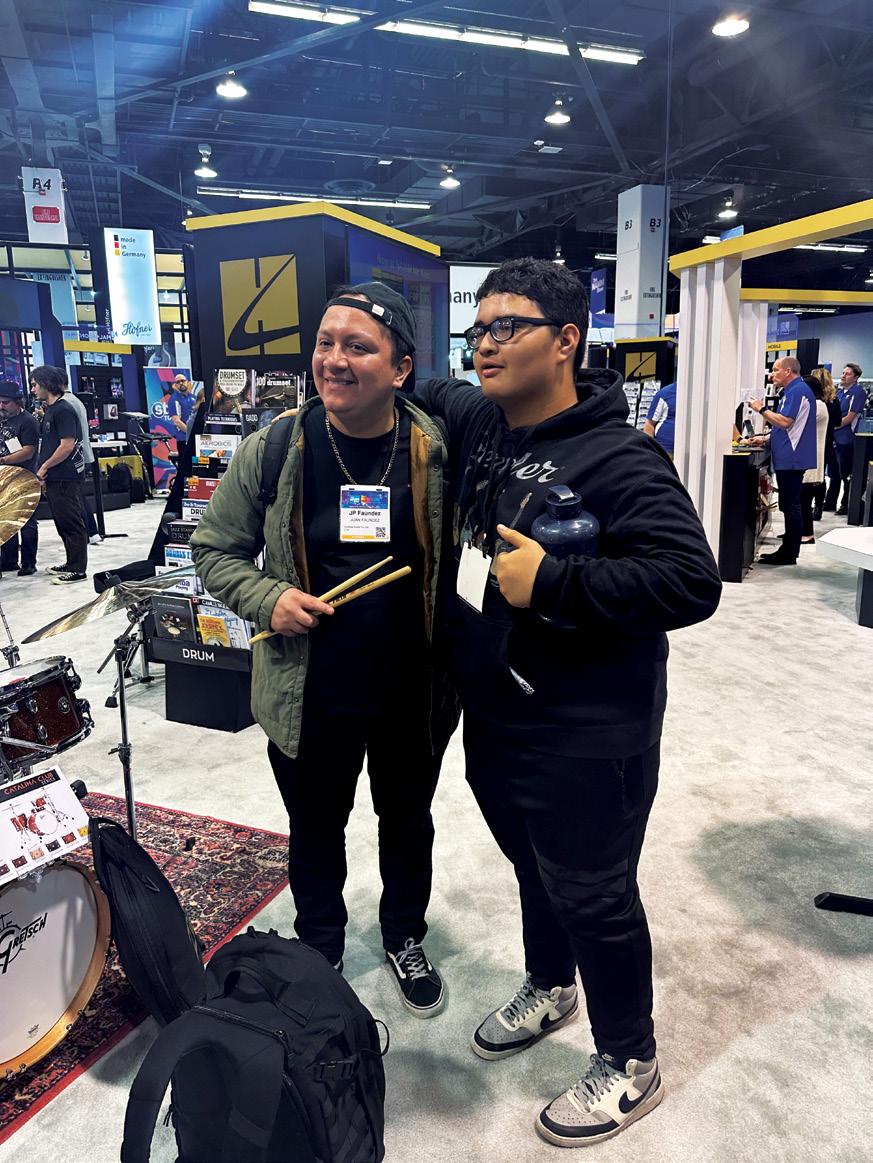
Standing on a stage at the Skirball Cultural Center in Los Angeles, eight young women raise protest signs high above their heads. More young women, peppered throughout the audience, also carry posters. The artfully rendered handmade signs not only remind the audience, “We are stronger together” and “Don’t judge,” but elevate issues in education, the environment, and gun control. Their rallying cry “Listen to us” rang throughout the recent A Place Called Home (APCH) GirlPower! Luncheon.
Dagmar, a high school senior and APCH member since she was nine, calls out to the crowd, “We are the next generation of educators, scientists, artists, doctors, inventors, changemakers and stewards of the future.” In response, the young women once again chanted, “Listen to us.” As Dagmar revisits this moment from this past May, she shares how
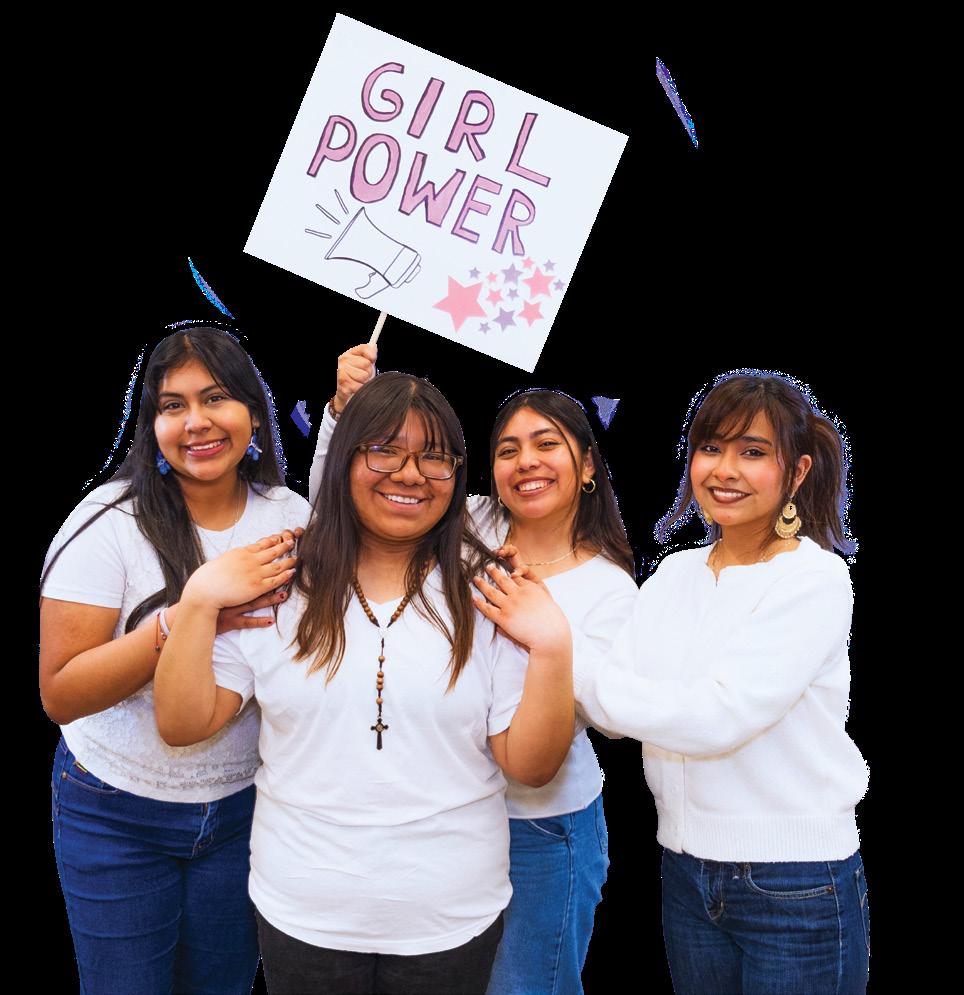
“I felt energy flowing in the room,” she said. “It was very electrifying, you could just feel the powerful womanhood. It was really emotional and very
This passionate moment represents the culmination of GirlPower, one of the programs available to high school students at APCH who identify as female. Members meet once a week for two hours and cover topics such as financial literacy,
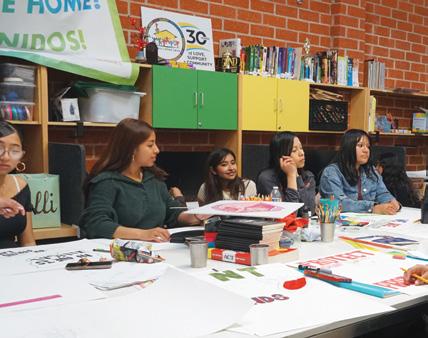
healthy relationships and sexual education. Guest speakers also visit to share career options.
The annual luncheon serves as the program’s showcase, and this year’s performance theme, “Ignite the Change,” was entirely member driven. “I, along with our CEO, Norayma Cabot, first gathered the girls and started to ask them what they were passionate about,” said Bernyce Talley, Associate Director of Arts and Creative Expressions. “What are you fired up about? And every single one of these girls had something to say.”
They shared their passions for immigration rights, reproductive rights, the prison industrial complex, and quality education. Instead of deciding on a spoken word presentation, as had been done in previous years, they came up with the idea of a mock protest.
“I told them to draw inspiration for their poster from what’s happening at the moment,” said Talley. “You are angry because this is actually impacting you, so it’s okay for you to raise your voice. You shouldn’t be whispering. The goal is for folks to really listen to you because this is your life and this is what impacts you.”
For Dagmar, the opportunity to speak her truth centered on education reform. She chose special education as her theme, and spoke about the problems she sees in this area, including the lack of resources and the lack of equity. “I even mentioned during my protest that’s why I want to be a special education educator,” she said. This fall, Dagmar will be attending UC Irvine,
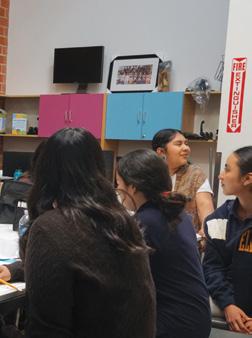
with the help of an APCH Shaheen Scholarship, to work toward achieving that goal. Her confidence on stage that day drew from years of experience at APCH. When her journey began she was initially drawn to the music and arts programs. She enrolled in GEMS (Girls Empowering Many), a program similar to GirlPower but designed for younger female-identifying members, before transitioning to GirlPower in high school.
“I have done performances before, I’ve been in the theater program at APCH, so I wasn’t super scared of being on stage and speaking out,” said Dagmar. “But these were my lines. I was able to show that part of me and what I thought and how I felt. And at the end people got up and you could just hear the thunderous applause.”
That applause wasn’t just for a performance well done—it was recognition of young women claiming their own empowerment. Through moments such as these, APCH ensures these voices don’t go unnoticed.

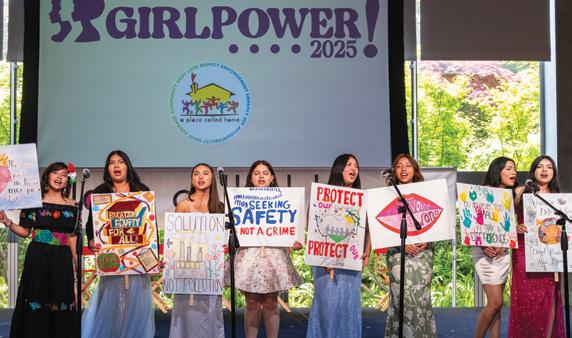
At A Place Called Home (APCH), mental health support is woven into every program. The counseling department’s five staff members— including two case managers and three clinical therapists—build relationships through formal appointments and referrals, but also make it a point to form relationships organically, often connecting with young people during games or casual encounters around the facility. They serve members from enrollment through college graduation—as well as their family members—at no cost.
“We’re here to go along their journey with them,” said Kerry-Ann Sleep-Frankel, Sr. Director of Mental Health Services.
This approach helps “de-stigmatize mental health,” she adds. “We teach them that it’s okay to talk about your feelings, to cry, to be scared or happy or afraid—all feelings are valid. Since we’ve been with these members through their different stages of development, if they need something when they’re older, they’re more likely to ask. That trust is already there.”
The proof of APCH’s approach lives in the voices of its young members. When we asked several little and middle—elementary and middle school—members to share their advice on common challenges kids

their age face, their responses revealed impressive moral courage, empathy, and wisdom.
Here is what they had to say:
Q: I’m scared to raise my hand in class because what if I’m wrong and everyone laughs?
Carmen and Zoey see mistakes as learning opportunities: Zoey, 10, said, “If you make a mistake, then you can learn from it. So, I think it would be good to raise your hand and see if it’s right or not. And if it’s not, then it’ll be fine. You’ll have another chance to get it right and once you do, they probably won’t laugh at you.”
Carmen, 13, is a little more introspective:
“Everyone can learn from their mistakes. It’s not a bad thing to experience them making fun for getting it wrong, but you always have to try in order to move forward.”
Josue and Zukeydi, both 8, keep it simple: “Just be confident and raise your hand. Just do your best,” suggests Josue, while Zukeydi offers, “You can do this. You might get embarrassed, but you can do this. It’s okay if you get it wrong. Everyone makes mistakes.”
Q: I noticed a friend being bullied by a classmate, what should I do?
While some members suggested talking to a teacher or parent right away, Melany, Zoey and Carmen also counseled standing up to the bully. Melany, 10, suggests: “You could tell them, ‘Could you please stop bullying me because I don’t like it and that hurts my feelings.’”
Zoey, 10, recommends being supportive: “Be with your friend to help them stand up for themselves. Tell them, ‘Believe in yourself. You can do this. Don’t let the clouds come in, just let your sunshine through.’” She also adds, “You can also ignore them cause they have no control over you, so you can just focus on yourself. They have no rights over you. You could probably tell yourself positive affirmations too.”
Carmen, 13, takes a more direct approach: “I would tell them to back off, which is a warning, and if they don’t listen to me, then I go to either a staff member, teacher, or the principal and tell them what’s going on.”

Q: I have a friend who has been having a hard time lately, what are some good ways to cheer them up?
Markel, 14, takes a therapeutic approach: “Talk to them. Ask them, are you okay? If you ever need help, I’m here.” Christopher, 9, suggests activities: “Hang out with them, share things and play with them.” Zoey, 10, emphasizes support: “Help support them and ask if they need anything. Maybe they can take some time alone to process their thoughts or talk to somebody, like an adult.”
Others focus on kind gestures. Julissa, 9, would “try playing with her, tell her she is pretty, and that she has nice clothes.” Zukeydi, 8, would simply “be her friend.” Yaretzy, 13, and Stephanie, 9, suggest gifts—Yaretzy would give “baked goods or something that they really love,” while Stephanie would make something personal: “I would paint their favorite animal or cartoon character.”
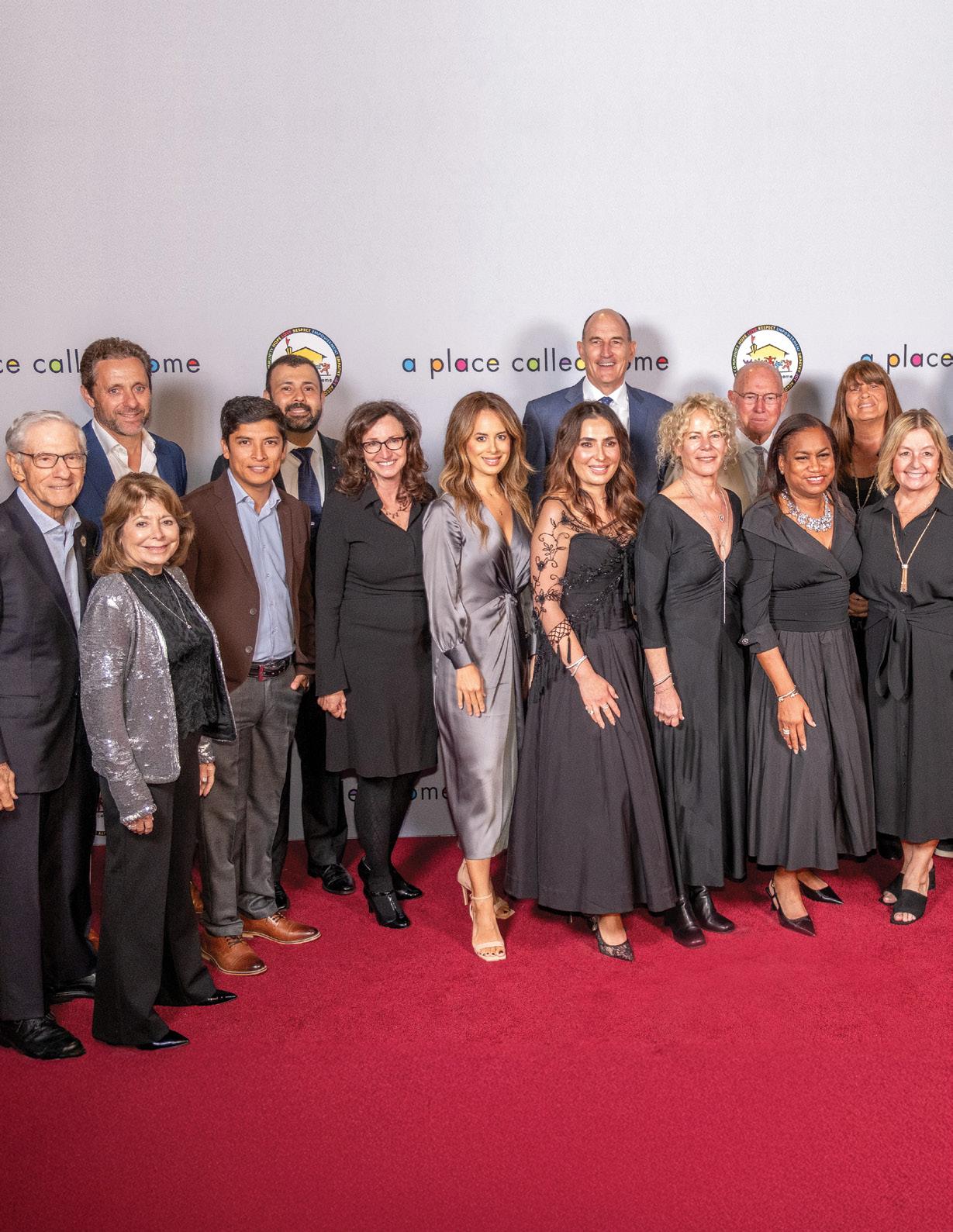

Susan Napier, Board Chair
Gareth Schweitzer, Vice Chair
Adam Rosenblatt, Vice Chair
Barbara Glazer, Treasurer
Maryellen Zarakas, Secretary
Dawn Campbell
Michael Converse
Kathryn Frazier
Sharon Hauptman
Tom McCabe
Edgar Morales
Howard Sherwood
Stephanie Sherwood
Vera Stewart
Zack Stiefler
Hamed Tavajohi
Marshall Wax
Susan Wolf
Adam Rosenblatt, Chair
Abril Calderon
Derrick Haynes
Emily Hopton
Holly May
Tony Hajjar
Lilly Yeatman
Jenna Chiabai
Jared Page
Kiersten Robinson
Josh Russak
Your support drives our mission forward! Visit apch.org/donate to make a gift.
Join The Social Change Club
With a monthly gift, you will have access to exclusive benefits and will help provide consistent support for APCH’s mission! Learn more at apch.org/scc
A Place Called Home is deeply grateful for those who have included us in their estate plans. Contact donations@apch.org to discuss options for your philanthropic legacy.
Please also consider making a gift of stock or a tax-advantaged qualified charitable distribution from your IRA. Email us at donations@apch.org to find out more!
to Donate Scan to Learn More

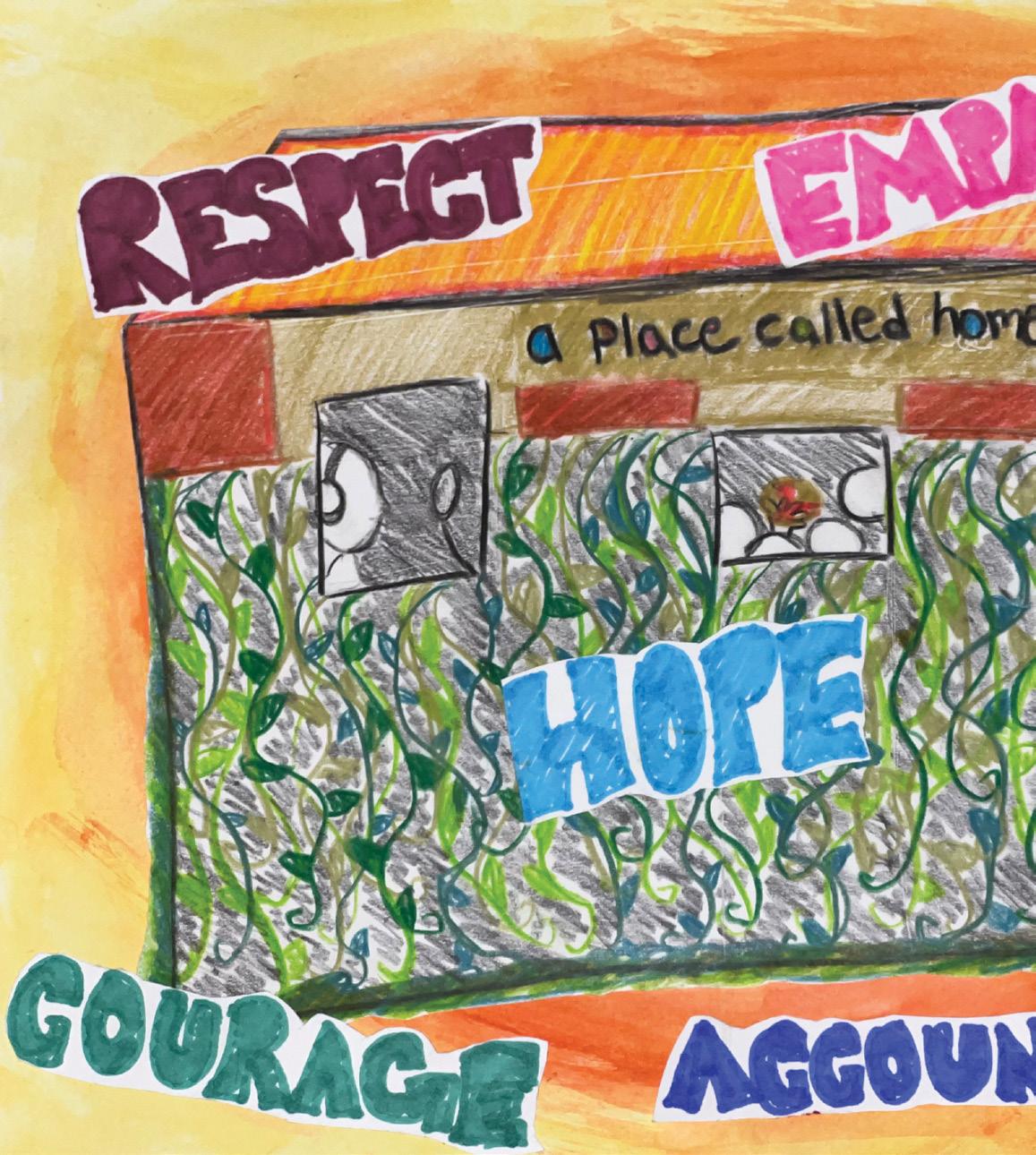

Ashley has been a member of APCH’s Visual Arts program since she was eight years old. She is now 16 and in high school!

